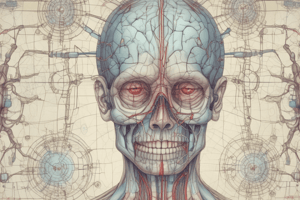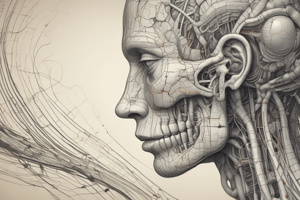Podcast
Questions and Answers
What is the olfactory nerve responsible for?
What is the olfactory nerve responsible for?
- Hearing
- Smell (correct)
- Vision
- Taste
Which nerve is responsible for vision?
Which nerve is responsible for vision?
- Facial Nerve
- Trigeminal Nerve
- Oculomotor Nerve
- Optic Nerve (correct)
What are the functions of the oculomotor nerve?
What are the functions of the oculomotor nerve?
- Smell
- Eye movement, pupil constriction (correct)
- Taste
- Hearing
Which nerve is responsible for chewing and swallowing?
Which nerve is responsible for chewing and swallowing?
What functions does the facial nerve serve?
What functions does the facial nerve serve?
What is the role of the spinal accessory nerve?
What is the role of the spinal accessory nerve?
What is the primary function of the auditory nerve?
What is the primary function of the auditory nerve?
What does the vagus nerve control?
What does the vagus nerve control?
What is the hypoglossal nerve responsible for?
What is the hypoglossal nerve responsible for?
Match the cranial nerves with their primary functions:
Match the cranial nerves with their primary functions:
Flashcards
Olfactory Nerve Function
Olfactory Nerve Function
Responsible for the sense of smell.
Optic Nerve Function
Optic Nerve Function
Transmits visual information from the retina to the brain.
Oculomotor Nerve Functions
Oculomotor Nerve Functions
Controls eye movement and pupil constriction.
Trigeminal Nerve Function
Trigeminal Nerve Function
Signup and view all the flashcards
Facial Nerve Functions
Facial Nerve Functions
Signup and view all the flashcards
Spinal Accessory Nerve Role
Spinal Accessory Nerve Role
Signup and view all the flashcards
Auditory Nerve Function
Auditory Nerve Function
Signup and view all the flashcards
Vagus Nerve Control
Vagus Nerve Control
Signup and view all the flashcards
Hypoglossal Nerve Function
Hypoglossal Nerve Function
Signup and view all the flashcards
Study Notes
Cranial Nerves Overview
- There are twelve pairs of cranial nerves, primarily responsible for sensory and motor functions.
- Mnemonic: "Some say marry money but my brother says big brains matter more" helps remember the order and function types.
Cranial Nerve Functions and Definitions
- Olfactory Nerve: Responsible for the sense of smell (Sensory).
- Optic Nerve: Involved in vision (Sensory).
- Oculomotor Nerve: Controls eye movement and pupil constriction; transmits sensations from eye muscles (Motor).
- Trochlear Nerve: Governs eye movements and sensations from eye muscles (Motor).
- Trigeminal Nerve: Responsible for chewing, swallowing, and facial sensations (Both; sensory and motor).
- Abducens Nerve: Facilitates eye movement and sensations from eye muscles (Motor).
- Facial Nerve: Manages facial expressions and taste sensations (Both; sensory and motor).
- Auditory Nerve: Critical for hearing and balance (Sensory).
- Glossopharyngeal Nerve: Involved in swallowing, salivation, and taste (Both; sensory and motor).
- Vagus Nerve: Controls larynx, regulates organs, and provides sensations from trunk and neck (Both; sensory and motor).
- Spinal Accessory Nerve: Coordinates movement of neck, shoulders, and head (Motor).
- Hypoglossal Nerve: Manages tongue movement and sensations from tongue muscles (Motor).
Summary of Functions
- Sensory Functions: Olfactory, Optic, Auditory.
- Motor Functions: Oculomotor, Trochlear, Abducens, Spinal Accessory, Hypoglossal.
- Both Sensor and Motor Functions: Trigeminal, Facial, Glossopharyngeal, Vagus.
Key Takeaways
- Each cranial nerve has distinct functions that are crucial for sensory perception and motor control.
- Understanding the types (sensory, motor, both) is crucial for identifying their roles in the nervous system.
Studying That Suits You
Use AI to generate personalized quizzes and flashcards to suit your learning preferences.




